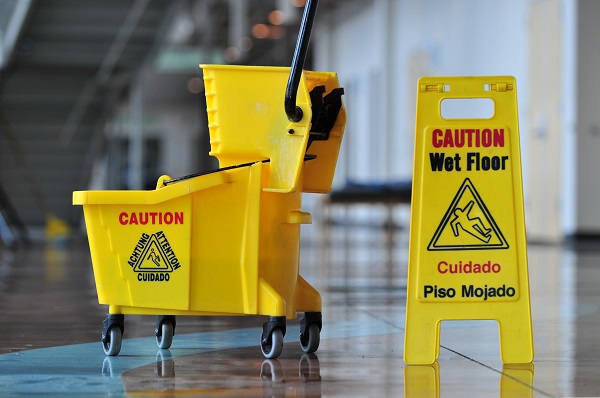Property owners are responsible for maintaining safe conditions on their properties to ensure that visitors do not injure themselves. Because of this legal obligation, property owners are often held accountable for slip and fall accidents that occur on their property. But, this does not mean that property owners immediately take the blame for every injury sustained on their property. Many property owners put up a fight in an attempt to avoid liability in a personal injury case. How? Here are some of the most common defense strategies used in slip and fall cases:
“You’re to blame.”
A property owner can only be held liable if his negligence led to the victim’s slip and fall injuries. Therefore, many property owners will try to escape liability by proving that it was actually the victim’s negligence that caused the slip and fall accident. For example, if a grocery store customer is too distracted by her phone to notice the “Wet Floor” sign, she may be found partially or totally responsible for her injuries if she slips on the wet floor.
Colorado is a modified comparative negligence state, which means victims can still recover compensation for their injuries if they were less than 50% responsible for the accident. But, if a victim is determined to be partially responsible, he will not receive as much compensation. This means defendants can use this strategy to lower the amount of compensation they owe the plaintiff.
“You were trespassing.”
Trespassers do not have the same rights as legal visitors. Trespassers can only recover compensation for injuries deliberately caused by the property owner. If a trespasser is hurt in a slip and fall accident on someone else’s property, the property owner is not liable unless he deliberately created a safety hazard to hurt the victim. Therefore, property owners can use this as a defense in slip and fall cases in order to escape liability.
“You knew the risks of coming onto my property.”
The assumption of risk defense can also be used in a slip and fall case. This defense comes into play when the victim knew that participating in a certain activity was risky, but decided to do so anyways. If she was injured as a result of the activity, she may be held partially or totally liable since she knew of the risks beforehand. For example, let’s say a property owner warns his guest that the stairs leading up to his house are slippery from a recent rainstorm. The guest walks up the stairs anyways, slips, and injures herself. In this case, the guest knew of the risk involved and chose to engage in the activity anyways, so she may be held partially or totally liable.
These defense strategies may be common, but they’re not always effective. If you have been injured in a slip and fall, let the personal injury attorneys at Reisch Law Firm fight to hold the property owner accountable. Schedule a free consultation today by calling 303-291-0555 or filling out this online form.


